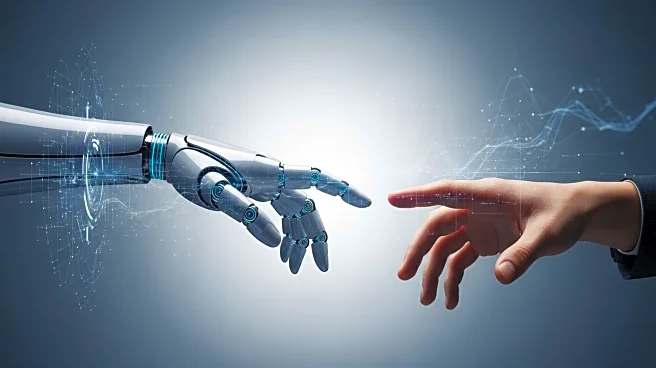What is the story about?
What's Happening?
A recent report by Accenture, titled 'Learning Reinvented,' reveals a significant gap in AI readiness among global workforces. The study surveyed 14,000 workers and 1,100 executives across 12 countries, finding that while 84% of leaders anticipate regular human-AI collaboration within three years, only 26% of workers have received training for such collaboration. Despite 80% of employees viewing AI as an opportunity, only 11% of organizations are equipped to enable effective co-learning. Karalee Close, Accenture's global lead of talent and organization, emphasizes the need for organizations to integrate continuous co-learning and redesign work processes to foster human-AI collaboration. The report suggests strategies such as redesigning roles, embedding learning into daily work, designing AI tools around people, ensuring governance and accountability, and fostering a culture of curiosity and creativity.
Why It's Important?
The findings underscore a critical challenge for businesses aiming to leverage AI technologies effectively. The readiness gap could hinder the potential benefits of AI, such as increased efficiency and innovation. Organizations that fail to address this gap may struggle to remain competitive as AI becomes more integral to business operations. The report highlights the importance of strategic integration of AI into workflows, which could lead to more connected and resilient operations. Companies that successfully bridge this gap stand to gain a significant advantage in the evolving digital landscape, potentially leading to enhanced productivity and innovation.
What's Next?
Organizations are encouraged to adopt the strategies outlined in the report to close the AI readiness gap. This includes redesigning roles to integrate AI, embedding continuous learning, and fostering a culture of innovation. As companies implement these changes, they may see improved collaboration between humans and AI, leading to more efficient and innovative business practices. The emphasis on governance and accountability is expected to build trust among employees, facilitating smoother adoption of AI technologies. The ongoing evolution of AI in the workplace will likely prompt further research and adaptation strategies to ensure successful integration.
Beyond the Headlines
The report highlights a broader cultural shift towards integrating AI into everyday work, which could redefine job roles and organizational structures. This shift raises ethical considerations regarding job displacement and the need for reskilling workers. As AI tools become more prevalent, organizations must balance technological advancement with workforce development to ensure equitable growth. The emphasis on trust and accountability also points to the need for transparent AI governance frameworks, which could influence regulatory policies and industry standards.

















